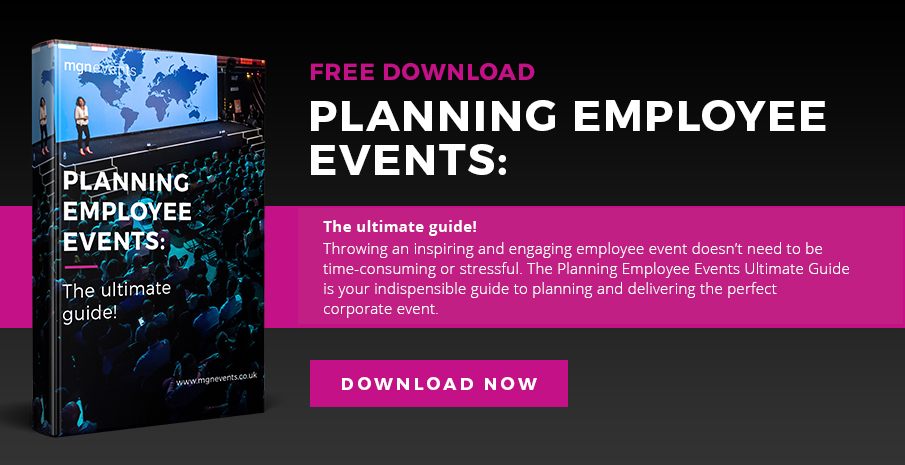Learn from the world’s most admired public speakers with these 10 tips for effective public speaking at corporate events. From preparation to delivery, discover how to captivate your audience and leave a lasting impression.
Read time: 5 – 7 minutes
Key takeaways:
- Discover how to use personal anecdotes and make your delivery engaging
- Find out how to connect with your audience using storytelling and visuals
- Learn how to be authentic, humorous, and confident
Why effective public speaking matters
As CEOs, leaders, and business professionals, you understand the importance of making a lasting impression on your clients, colleagues, and stakeholders. One of the most effective ways to do that is by giving an engaging speech, talk, or presentation at a corporate event. Whether it’s an internal event that focuses on employee engagement or a sales-focused corporate event, captivating your audience can make all the difference in the success of your event.
Engaging your audience during corporate events is not only crucial to holding the attention of your audience, but it also helps to build rapport, establish credibility, and convey your message effectively. A well-delivered speech can make an indelible mark on your listeners, ensuring that your message is heard, remembered, and acted upon.
Engaging, impactful speeches
“Developing effective presentation skills is also a critical aspect for those aspiring to become successful event planners. Last year, I was fortunate enough to visit Windsor College, where I had the opportunity to address a group of eager students on the significance of thorough preparation for a fruitful presentation. Giving back to the community in this way was an absolute pleasure, and I trust that our interaction helped inspire the next generation of event planners,” says Mike Walker, Managing Director, MGN events.
“There are common misconceptions about public speaking, such as the idea that some people are born with public speaking talent, that nerves are always a bad thing, and that the goal is to be perfect,” continues Mike. “In reality, anyone can learn to speak effectively, nerves can be mastered and used to your advantage, and you can learn how to connect with your audience and clearly convey your message.”
This article is packed with valuable insights from some of the world’s top-notch leaders and CEOs on delivering an engaging and impactful speech or presentation.
So, if you’re keen to master the art of public speaking at corporate events, read on:
1. Know your audience:
Research your audience and tailor your message to their interests and needs. Sir Richard Branson, the well-known British entrepreneur, is admired for his ability to connect with people on a personal level, often using humour and storytelling to engage his audiences, but always with a clear focus on what his audience wants to hear.
2. Be passionate:
When you speak with enthusiasm and conviction, your audience is more likely to be engaged and inspired. Ratan Tata, an Indian philanthropist and businessman, is known for his dedication to social causes and his passion for innovation. He often uses personal anecdotes and examples to convey his message and to connect with his audience.
In 2019, Ratan recounted the tale of his venture into launching a car production line in India. He stated that as his company drew nearer to the market launch of the Indicar, a completely Indian product, many individuals who had earlier doubted the feasibility of the project distanced themselves from him – a conduct he referred to as “distancing themselves from failure”. This statement, coupled with his smile and dry delivery, evoked laughter from the audience.
Ratan shared that he felt friendless and that all the cautions given to him by people would probably prove true. He then gave a modest smile and confessed that the car was able to garner a 20% market share.
3. Use simple language:
Clear and concise language is key to effective communication. French lawyer and politician, Christine Lagarde is known for her ability to explain complex economic concepts in simple terms. She advises speakers to avoid using technical jargon and to communicate their message in language that the audience can understand.
During a 2022 interview, Christine Lagarde explained the causes behind rising inflation in Europe in a relatable way. When asked why the Federal Reserve chair has proposed raising interest rates in the US, she uses relatable language to explain that while the goal is the same as in Europe, the situation is different and requires different approaches. She demystified the scenario by avoiding industry jargon and using everyday language to explain complex scenarios to the audience.
4. Prepare thoroughly:
Preparation is essential to a successful speech. Angela Merkel, who was the first woman to hold the office of Chancellor of Germany, is known for her meticulous attention to detail and her thorough preparation for public speaking engagements. She advises speakers to think through their message and to practise their delivery, taking into account the needs and interests of their audience.
5. Connect emotionally:
Emotional connections are key to engaging your audience and making your message memorable. Jack Ma, the billionaire entrepreneur and founder of Alibaba, is known for his ability to connect with his audience on an emotional level, often using personal stories to convey his message. He advises speakers to be authentic and to share their personal experiences in a way that resonates with their audience.
6. Use humour:
Humour can be an effective tool for engaging your audience and making your message more memorable. Richard Branson is known for his light-hearted and humorous approach to public speaking, often using jokes and anecdotes to put his audience at ease and to convey his message.
During a talk at a conference in 2012, Branson recounted a humorous story about a prank he played on British Airways. He dressed up as a female flight attendant on one of British Airways’ inaugural flights, carrying a handbag full of British Airways’ products, and served passengers drinks while pretending to be part of the cabin crew. The incident received widespread media coverage and is a good example of Branson’s use of humour to engage his audience.
7. Use body language:
Effectively: Body language is an integral part of effective communication. Christine Lagarde advises speakers to use their body language to convey confidence and reinforce their message.
Sir Richard Branson is known for his relaxed and informal posture on stage, which helps to put his audience at ease and to create a more open and engaging atmosphere.
8. Engage your audience:
Engaging your audience is key to a successful speech. Ratan Tata often uses questions and examples to involve his audience and to make his message more interactive.
He advises speakers to think about the needs and interests of their audience and to use that knowledge to create a more engaging and interactive experience.
9. Be authentic:
Authenticity is key to building trust and making a lasting impression on your audience. Angela Merkel is known for her direct and straightforward approach to public speaking, which helps to convey her sincerity and authenticity.
She advises speakers to be true to themselves and to their message, to establish a connection with their audience and create a memorable experience for all involved. By embracing your unique perspective and speaking from the heart, you can elevate your public speaking skills and leave a lasting impact on your listeners.
10. Practise makes perfect:
Practice is essential to improving your public speaking skills. Jack Ma advises speakers to practise their delivery and use personal anecdotes and stories to connect with their audience.
By being authentic, using humour, engaging your audience, and practising your delivery, you too can become a confident, successful public speaker.
It’s all about engaging your listeners
Delivering a successful corporate speech or presentation is crucial for leaving a lasting impression on your audience. It’s all about engaging your listeners and conveying your message effectively.
By following the tips outlined in this article, you’ll be able to master public speaking to captivate your audience, hold their attention, and make your presentation unforgettable. Remember, to prepare thoroughly, connect with your audience, and use storytelling and visual aids to keep things interesting.
With these tools at your disposal, you’ll be well-equipped to give a talk or public speaking presentation that will be remembered long after the event is over.
So be confident, go forth, and give it your best. And if you need some inspiration or help planning your corporate event, check out our case studies or get in touch with our team at MGN events.
Further reading:
Employee engagement and retention trends 2023
5 amazing and cost-effective employee engagement tactics
Planning a conference? Why not make it an unconference instead!
6 ways hybrid events keep companies on track
How events can help build a resilient workforce
6 Creative Event Ideas for Amazing Corporate Events
6 reasons companies should have a hybrid employee event strategy
7 great ways to improve employee well-being at internal events
Sources:
Ratan Tata personal anecdote speech
https://www.inc.com/kaitlyn-wang/jack-ma-alibaba-tips-for-success.html
Life at 30,000 feet | Richard Branson
What public speakers can learn from Angela Merkel | Ginger Leadership Communications (gingerleadershipcomms.com)
https://www.linkedin.com/pulse/8-leadership-lessons-sir-ratan-tata-you-wish-knew-before-mohit-varma
https://www.timetomarket.co.uk/blog/public-speaking-2/christine-lagarde-speech/





